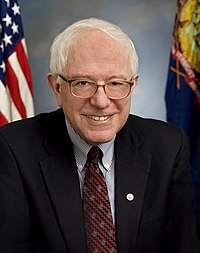Political editing in the context of the US presidential primaries
Digital Trends reports (Dec. 10) on political editing in the context of the presidential primaries in the United States.
| “ | The United States is currently in the grip of a presidential primary, meaning people are looking for impartial information on the parties and politicians involved. Wikipedia will be the go-to source for a great swathe of this knowledge. But who's writing these entries, and for what purpose? It turns out, both ends of the political spectrum are making their voices heard—a process that can distort the truth. | ” |
The article, written by Brad Jones and titled "Beneath every presidential candidate's Wikipedia page lies a vicious tug-of-war", discusses editing at the Bernie Sanders article and features comments from Calidum, one of many editors to have contributed to that Wikipedia biography.
| “ | The run of the mill vandalism I see everyday isn't that big of an issue to me, because it's quickly dealt with," Calidum [says]. "Sometimes I even laugh at it before reverting it." But there's another kind of edit that's a more serious concern to upstanding users like him.
"The bigger issue for me, and I would assume many editors, though I can't speak for them, is people who use Wikipedia to push a certain agenda or engage in battleground behavior. Those are not as frequent as vandalism, but far too common," Calidum tells me. "And, while the community has ways of dealing with vandalism, its ability to handle point-of-view pushers and similar problematic editors is lacking. |
” |
Jones says he got in touch with Calidum because of a particular edit to the Sanders biography made by an account named Autoerotic Mummification, since indefinitely blocked as a sockpuppet of Grundle2600.
| “ | As you may well have guessed by now, Grundle2600's political views tend to the right. [...] There are no doubt plenty of trolls who visit Wikipedia solely for the purpose of vandalism. Grundle2600 doesn't seem to be part of that contingent. He's clearly making edits that he believes are useful, and isn't swayed by the Wikipedia community's point of view. | ” |
Jones then moves on to the question of what oversight there is on Wikipedia, quoting James Alexander, manager of Trust & Safety at the Wikimedia Foundation, and Juliet Barbara, the Foundation's Senior Communications Manager.
| “ | James is one of 280 paid employees on the books of the Wikimedia Foundation. Their job isn't to decide what sort of content ends up on the site. Instead, it's to ensure that the platform provides an open and neutral space for its community, who are then free to shape its output for themselves. [...]
Of course, there are systems in place should things get out of hand. "We probably get one or two threats of harm per week," James told me. He's part of a group of staff members who can be contacted at any time about a serious situation, whether he's at his computer or fast asleep in bed. But such situations don't include routine edits. The Wikimedia Foundation is keen to wash its hands of any decision-making that influences what sort of viewpoint is represented on the site. To maintain true neutrality, it's crucial that the community is trusted to police itself. |
” |
Juliet adds that Wikipedia's Arbitration Committee is there to handle conflicts between editors and that undisclosed paid advocacy is another issue—though one that seems to have become less prevalent in party politics:
| “ | The fact that it's so obvious means that it's no longer a viable option for political parties. "They're trying to help explain to their candidates and their members the right way to do it," James continues, without mentioning a particular party by name. "They're getting better." [...]
But what about Grundle2600, who's spent seven years being told that his edits don't fit the bill? Is he a dedicated editor trying to ensure a balanced view, or a political missionary looking to enforce his agenda? That depends on who you ask—and it's the reason the war to mold Wikipedia won't end as long as the site exists. |
” |

